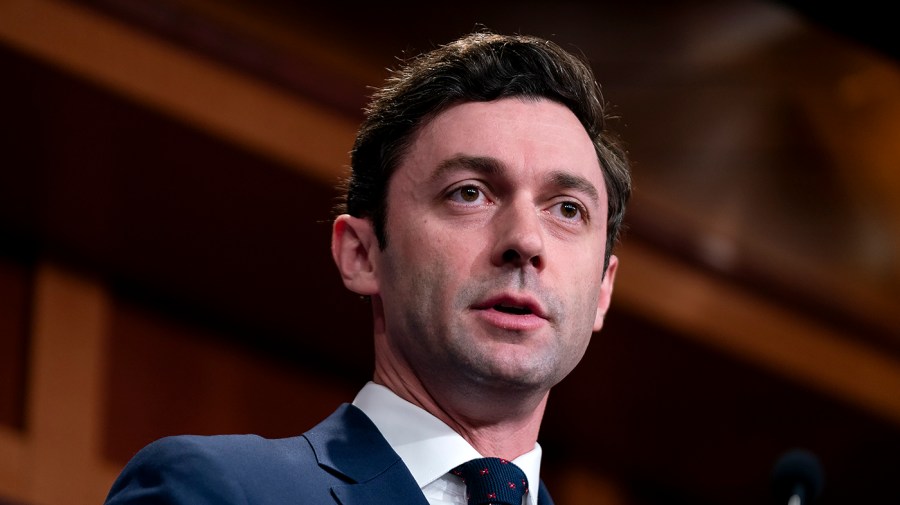
Georgia Democratic Sen. Jon Ossoff’s first reelection bid, set to be a marquee 2026 Senate race, has both parties sharpening their knives.
The GOP sees his seat as one of the best opportunities to knock off an incumbent, particularly after President-elect Trump won the state last year.
But Democrats see Ossoff as a strong incumbent who could benefit from a midterm year, when the opposite party of the president’s historically has gained seats.
Both parties also agree neither side can take the high-stakes seat for granted.
“It’s not clear what Georgia is right now,” said political strategist Fred Hicks, “other than a battleground state, an expensive battleground state, and one that will serve, I think, as a sort of an opening bell, if you will, for 2028 …”
Ossoff is no stranger to competitive — and expensive — campaigns. He narrowly lost a House bid in 2017 for Georgia’s 6th Congressional District.
Ossoff later made a run for former Sen. David Perdue’s (R-Ga.) seat in 2020, forcing the Georgia Republican into a runoff and winning his seat in 2021.
The first millennial elected to the Senate, Ossoff has maintained a largely low profile. His office has boasted that he passed a record number of stand-alone bills into law as a first-term senator in his first two years in office, and he’s worked on legislation ranging from strengthening oversight into the Federal Bureau of Prisons to mental health care access for military families and service members.
He also received a plum assignment on the Senate Appropriations Committee, and members on both sides of the aisle have lauded him for his constituency services.
Yet Ossoff’s reelection bid will offer a key test for Democrats on whether the party can retain a key Senate seat in a state Trump won in 2024. Ossoff, for his part, has heightened expectations about the campaign ahead.
“For four years we have been laying the groundwork and are already building the most effective, the most massive and the best resourced effort to empower an overwhelming and victorious coalition in 2026,” Ossoff said in a statement.
“This will be the biggest and most effective turnout effort in the history of Georgia politics,” he added.
Ossoff has said he wants to work with the Trump administration, and he told the Journal-Constitution he would “give everyone a fair shake” when it comes to Trump’s nominees.
But as Ossoff looks to court Republican and independent voters who voted for Trump, he’ll also need to shore up other blocs in his coalition, including Jewish voters.
Ossoff, along with fellow Georgia Democratic Sen. Raphael Warnock, received some criticism for voting for two resolutions that would have blocked certain arm sales to Israel. Both motions failed to become law.
Ossoff, who is Jewish, noted former President Ronald Reagan — who cut off access to certain weapons to Israel after it invaded Lebanon — in defending his vote, saying using the leverage “that comes with the provision of arms” was “not just sometimes necessary, it’s expected and appropriate.”
Marshall Wittmann, a spokesperson for the American Israel Public Affairs Committee (AIPAC), told The Hill in an email their organization was “very disappointed in Senator Ossoff’s vote to undermine American support for our ally Israel,” but added it hasn’t made a decision on whether to wade into the Senate race.
Hicks said Ossoff “has a burden that Sen. Warnock does not have,” explaining Ossoff is “caught in the middle” between the position some Jewish Americans want him to take and that of younger and liberal Democrats.
Ossoff is also navigating internal state party politics after the Journal-Constitution reported he had spoken with state party chair and Rep. Nikema Williams (D-Ga.) about resigning following Trump’s win in the state.
Macon-Bibb County Mayor Pro Tem Seth Clark suggested Ossoff’s move was a “breath of fresh air.” But Ossoff’s call irked some party leaders, including Georgia House Minority Leader Carolyn Hugley (D), who suggested he was trying to demean and harass the state party chair.”
Still, Hugley said the squabbling won’t impact the party’s ability to rally around Ossoff in his reelection bid.
“I mean, we’re family, and families don’t always agree, and families have to have the latitude to say we don’t agree,” she told The Hill. “But that doesn’t mean that we are not going to come together and coalesce around our candidates when it’s time.”
Williams, in a statement to The Hill, noted the focus is on helping get Ossoff and other Democrats elected.
“We cemented the Peach State’s status as a battleground state heading into the 2026 cycle, and we’re going to keep doing the work needed to reelect Senator Ossoff, a Democratic governor, and Democrats up and down the ballot,” she said.
Republicans have to find a candidate to take on Ossoff, and many are waiting to see whether Georgia Gov. Brian Kemp (R) wades into the race. A source familiar said an announcement wasn’t imminent.
Other names in the mix include Reps. Buddy Carter (R-Ga.) and Marjorie Taylor Greene (R-Ga.) and Georgia Insurance Commissioner John King.
Republicans say they are not taking Ossoff for granted.
The Georgia GOP operative noted that Ossoff has been able to raise large sums of money for his campaigns and is good in interviews. Strategists also note cycles can be difficult election cycles for the party in power.
“Republicans, I think, will be successful if they’re unified. And if they’re unified, I think that they’ll succeed,” said Republican strategist Eric Tanenblatt, adding “the same holds true to the Democrats.”












